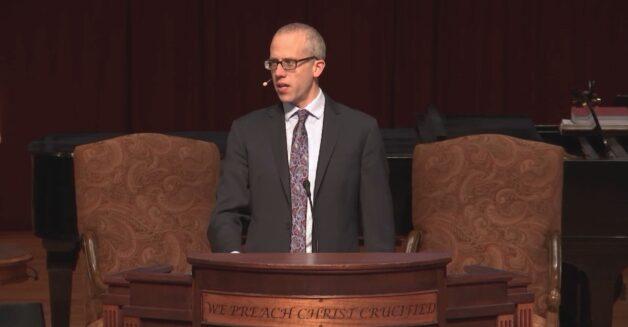
We’ve heard it so many times that it’s practically part of the Christmas story itself.
The Romans celebrated their seven-day winter festival, Saturnalia, starting on December 17. It was a thoroughly pagan affair full of debauchery and the worship of the god Saturn. To mark the end of the winter solstice, the Roman emperor established December 25 as a feast to Sol Invictus (the Unconquered Sun). Wanting to make Christianity more palatable to the Romans and more popular with the people, the church co-opted these pagan festivals and put the celebration of the birth of their Savior on December 25. For whatever the Christmas holiday has become today, it started as a copycat of well-established pagan holidays. If you like Christmas, you have Saturnalia and Sol Invictus to thank.
That’s the story, and everyone from liberal Christians to conservative Christians to non-Christians seem to agree that it’s true.
Except that it isn’t.
For starters, we should distinguish between roots that suggest a rip-off and roots that suggest a rebuke. The presence of some connection between a Christian celebration and a pagan celebration could imply a synchronistic copy-cat (“Hey, let’s Christianize this popular pagan holiday so as to make our celebration more palatable”), or it could mean a deliberate rejection (“Hey, this pagan holiday is horrible, so let’s put something distinctively Christian in its place”). After the conversion of Constantine in the fourth century, Christians did sometimes adapt and Christianize pagan festivals. Whether they did so wisely and effectively is open to historical debate, but the motivation was to transform the paganism of the Roman world rather than raze it to the ground. Even if Christmas was plopped down on December 25 because of Saturnalia and Sol Invictus, that by itself does not entail that the Christian celebration of Christ’s birth really began as a pagan festival.
But in the case of Christmas, there is good evidence that December 25 was not chosen because of any pagan winter holidays. This is the argument Andrew McGowan, of Yale Divinity School, makes in his article “How December 25 Became Christmas” (first published in Bible Review in 2002). Let me try to distill McGowan’s fine historical work by addressing three questions.
When did Christians first start celebrating the birth of Jesus on December 25?
Unlike Easter, which developed as a Christian holiday much earlier, there is no mention of birth celebrations from the earliest church fathers. Christian writers like Irenaeus (130–200) and Tertullian (160-225) say nothing about a festival in honor of Christ’s birth, and Origen (165–264) even mocks Roman celebrations of birth anniversaries as pagan practices. This is a pretty good indication that Christmas was not yet on the ecclesiastical calendar (or at least not widespread), and that if it were, it would not have been tied to a similar Roman holiday.
This does not mean, however, that no one was interested in the date of Christ’s birth. By the late second century, there was considerable interest in dating the birth of Jesus, with Clement of Alexandria (150–215) noting several different proposals, none of which was December 25. The first mention of December 25 as Jesus’s birthday comes from a mid-fourth-century almanac called the Philocalian Calendar. A few decades later, around AD 400, Augustine would indicate that the Donatists kept Christmas festivals on December 25 but refused to celebrate Epiphany on January 6 because they thought the latter date was a recent invention. Since the Donatists, who arose during the persecution under Diocletian in 312, were stubbornly opposed to any compromise with their Roman oppressors, we can be quite certain they did not consider the celebration of Christmas, or the date of December 25, to be pagan in origin. McGowan concludes that there must have been an older North African tradition that the Donatists were steeped in and, therefore, the earliest celebrations of Christmas (that we know about) can be dated to the second half of the third century. This is well before Constantine and during a time period when Christians were trying to steadfastly avoid any connections to pagan religion.
When was it first suggested that Christmas grew out of pagan origins?
None of the church fathers in the first centuries of the church makes any reference to a supposed connection between Christmas and Saturnalia or Sol Invictus. You might think, Well of course they didn’t. That would have been embarrassing. But if the whole point of basing your Christian birth holiday on an existing pagan birth holiday is to make your religion more popular or more understandable, surely someone would say something. Besides, as McGowan points out, it’s not like future Christian leaders shied away from making these connections. Gregory the Great, writing in 601, urged Christian missionaries to turn pagan temples into churches and to repurpose pagan festivals into feast days for Christian martyrs.
There is no suggestion that the birth of Jesus was set at the time of pagan holidays until the 12th century, when Dionysius bar-Salibi stated that Christmas was moved from January 6 to December 25 to correspond with Sol Invictus. Centuries later, post-Enlightenment scholars of comparative religions began popularizing the idea that the early Christians retrofitted winter solstice festivals for their own purposes. For the first millennium of the church’s history, no one made that connection.
Why do we celebrate Christmas on December 25?
The first answer to the question is that some Christians don’t. In the Eastern branch of the church, Christmas is celebrated on January 6, probably for the same reasons—according to a different calculation—that Christmas came to be celebrated on December 25 in the West. Although we can’t be positive, there is good reason to think that December 25 became the date for Christmas because of its connection to the (presumed) date of Jesus’s death and to the date of Jesus’s conception.
There are three dates at play in this calculation. Let’s start with the date of Jesus’s death.
Around AD 200, Tertullian of Carthage noted that Jesus died on the 14th day of Nisan, which was equivalent to March 25 in the Roman solar calendar. In the East, they made their calculation using the 14th day of the first spring month in their local Greek calendar. In the Roman calendar, this was April 6. So depending on who you asked, Jesus died on either March 25 or April 6.
In both the West and the East, there developed the same tradition that Jesus died on the same date he was conceived. An anonymous Christian treatise from fourth-century North Africa stated that March 25 was “the day of the passion of the Lord and of his conception. For on that day he was conceived on the same he suffered.” Augustine in On the Trinity mentioned that same calculation. Similarly, in the East, the fourth-century bishop Epiphanius of Salamis maintained that on April 6 Christ took away the sins of the world and on the same date was “shut up in the spotless womb of the holy virgin.” The fact that this curious tradition existed in two different parts of the world suggests it may have been rooted in more than mere speculation. If nothing else, as McGowan observes, these early Christians were borrowing from an ancient Jewish tradition that said that the most important events of creation and redemption occurred at the same time of the year.
From the date of Christ’s death, to the (same) date of his conception, we can easily see where the date of Christmas could have come from. If Jesus was conceived on March 25, then the best date to celebrate his birth must be nine months later on December 25 (or, in the East, January 6). While we can’t know for certain that this is where December 25 came from—and we certainly can’t be dogmatic about the historicity of the date—there is much better ancient evidence to suggest that our date for Christmas is tied to Christ’s death and conception than that it is tied to the pagan celebrations of Saturnalia and Sol Invictus.



